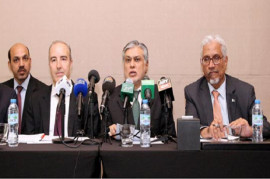
ISLAMABAD: The contribution of withholding taxes in direct tax revenue surpassed 75%, and brought in more than Rs860 billion to the government’s kitty in 2014-15.
On the other hand, the number of tax return filers went down considerably from 1.8 million in 2006 to 0.85 million in 2014-15. Is there a relationship between increasing collection under withholding tax and falling number of tax return filers?
Tax policy faces a stark choice between short-term measures to increase revenue and long-term tax reforms according to the principles of fairness, equity and transparency. Given various internal and international pressures, the finance minister and his tax machinery have opted for the shorter route to increase tax revenue. However, this choice is tantamount to killing the goose that lays the golden eggs.
The number of tax return filers (as per FBR records) stands at roughly where it was in 1999-2000. Tax return filers in 1999-2000 amounted to 0.97 million, and now they stand at 0.86 million. The tax register touched its peak in 2006-07, with 1.8 million tax filers. The number increased dramatically when the Universal Self-Assessment Scheme was introduced and the FBR introduced automation led reforms under the then chairman Abdullah Yousuf.
On the other hand, withholding taxes have assumed the position of a major source of revenue over time. From Rs71 billion in 2000 to Rs865 billion currently. Moreover, its contribution as a component of direct taxes has now surpassed 75%.
The withholding tax on banking transactions is relatively new and was limited to cash withdrawals untill now. It was introduced through the Finance Act 2005 whereby 0.1% charge was levied on cash withdrawals above Rs25,000. Since then, the rate on cash withdrawals has increased to 0.3%.
In its first fiscal year (2005-06), this tax on cash withdrawals brought in Rs2.5 billion. In FY 13-14, this particular source brought in Rs19.06 billion, which means a 660% increase in revenue collection from this head within a decade.
As tax return filers went out of the net, the FBR offered various incentives for tax and audit exemptions. However, as per one FBR official, such schemes only resulted in around 10,000 additional returns.
In 2014-15, the incumbent federal government introduced a distinction between filers and non-filers through Finance Act 2015. In the government’s own words, the purpose “is to make the cost of doing business for non-compliant, non-filers, higher than compliant taxpayers, filers”.
In other words, the law has been amended to the effect that non-compliant, non-filers will have to pay a higher tax at the time of collection or deduction.
Business community’s stance
The business community thinks otherwise. According to senior business leaders, which belong to the filer category, the FBR has shown them a way of escaping tax net, by continuing to pay withholding taxes at a higher rate. They are better off, money-wise, by not submitting tax returns, and keep on paying withholding taxes albeit at a higher rate.

If this trend continues, which is likely, the utility of FBR as a tax collecting authority and as a reliable enforcing regime will be highly questionable. If the state will depend primarily on the withholding agents for tax collection with increasing penalty for them for non-compliance, in addition to reliance on indirect taxes, one can easily question the utility of a 35,000-strong FBR, with a coterie of 1,500 plus officers.
Last, but not the least, there is concern that multiplicity and expansion of the regime only lead to more complex and hard to understand tax procedures. Resultantly, even those who want to file a tax return may desist from doing so. The increasing complexity of the tax system will serve as a boon for tax consultants, who may advice clients not to fill out tax returns out of pure self-interest.
The government’s increasing reliance on withholding taxes and decreasing concern with issues of tax equity can only result in one scenario. As the tax register continues to get thinner, informal economic activity will increase, and the government will lose its writ sharply. It will force the government to look outside or to the central bank to sustain its operations, thus further trapping us in the debt and inflation cycle.
The writers are affiliated with the PRIME Institute, an independent think tank based in Islamabad.
Published in The Express Tribune, August 24th, 2015.
Like Business on Facebook, follow @TribuneBiz on Twitter to stay informed and join in the conversation.

















































COMMENTS (3)
Comments are moderated and generally will be posted if they are on-topic and not abusive.
For more information, please see our Comments FAQ